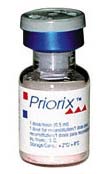The Ho Chi Minh City Department of Health has urgently requested healthcare units in Ho Chi Minh City to immediately suspend the administration of the Priorix vaccine for measles, mumps, and rubella produced by GlaxoSmithKline.
 |
Priorix Vaccine |
Six children in District 5 experienced severe shock after receiving the vaccine, with one case resulting in death.
Additionally, the Department of Health has sent a formal request to GlaxoSmithKline to collaborate with health authorities and relevant agencies to investigate the causes of adverse reactions following the administration of the Priorix vaccine in children.
Adverse Reactions
As of 2 PM on May 11, five children were still on ventilators in the Intensive Care Unit at Children’s Hospital No. 1. These children suffered from drug shock after receiving the Priorix vaccine for mumps, measles, and rubella.
Previously, on the evening of May 10, 13-month-old Nguyen Thien Bao died due to drug shock after receiving the vaccine on May 9 at the health station in Ward 9, District 5.
Another case involved 16-month-old Hoac Chi Vinh, who received the Priorix vaccine on May 8 at the health station in Ward 8, District 5. However, on May 9, Vinh was admitted to Children’s Hospital No. 1 in a state of high fever, cyanosis, and generalized edema. Currently, Vinh’s condition remains critical, and doctors in the Intensive Care Unit are managing shock and providing mechanical ventilation.
Upon being informed, the Department of Health requested all healthcare units in Ho Chi Minh City, especially the District 5 Health Center, to temporarily halt the administration of the Priorix vaccine by GlaxoSmithKline and to inventory and seal the vaccine batch in question.
Simultaneously, healthcare units are conducting health assessments for children who received this vaccine over the past week.
Additionally, the Ho Chi Minh City Center for Disease Control and Prevention is organizing sample collection from this vaccine batch for testing according to established protocols.
Drug Shock or Anaphylaxis?
Dr. Le Thanh Chien, Deputy Director of the Tropical Hospital, stated that all vaccines administered for infectious diseases carry the risk of causing drug shock (known as anaphylactic shock). The mechanism behind drug shock is due to the antigen-antibody reaction. However, for the case of the measles, mumps, and rubella vaccine, the occurrence rate is not high. In some medications, manufacturers recommend conducting a “skin test” before injection, but this is generally not advised for vaccines. |
Meanwhile, Dr. Nguyen Huu Duc from the University of Medicine and Pharmacy in Ho Chi Minh City was very cautious when discussing the causes of severe shock reactions following the administration of the measles, mumps, and rubella vaccine in the aforementioned pediatric patients.
According to him, if it is an anaphylactic shock, it can occur at any time and in any person, even if there is no prior history of allergies. This is an unpredictable phenomenon.
Especially, Dr. Duc emphasized that vaccines are biological preparations derived from biological materials (or foreign proteins), making them more likely to cause anaphylactic shock and lead to death than any pharmaceutical product.
Anaphylactic shock (also known as anaphylactic reaction) is a severe allergic reaction when the body comes into contact with an allergen (also known as an allergen or antigen). If this allergic reaction occurs and is not detected and treated promptly, the patient can die.
Common causes of anaphylactic shock include the use of medications, particularly injectable forms. Some drugs that pose a high risk of causing shock upon injection include Penicillin, Streptomycin, and some other antibiotics, with symptoms appearing within 1-2 minutes, such as cyanosis, bronchospasm, rapid pulse, respiratory failure, cardiovascular collapse, hypotension, coma, and potentially death if not treated immediately.
Dr. Nguyen Huu Duc explains that one of the biological substances known as histamine plays a crucial role in anaphylactic shock. Normally, histamine is concentrated in white blood cells (especially mast cells) and combines with another biological substance, heparin, which does not exhibit toxicity. Only when the body encounters an allergen (such as medication) will antibodies against it be produced.
The reaction between antibodies and allergens can be so intense that it causes a disturbance, leading cells containing the histamine-heparin complex to trigger the release of free histamine, resulting in severe symptoms known as anaphylactic shock.
Patients experiencing anaphylactic shock require immediate emergency treatment, primarily with adrenaline injections (to raise and maintain blood pressure), glucocorticoids (such as methylprednisolone), antihistamines (such as promethazine) to treat the allergy, oxygen therapy, and effective ventilation…


















































